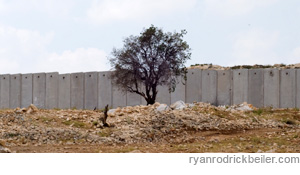Posts By This Author
A Heart for Peace
A VARIETY OF EVANGELICAL peacemaking efforts have sprung up in recent years, from the Two Futures Project, which seeks a world without nuclear weapons, to the World Evangelical Alliance’s Peace and Reconciliation Initiative, which seeks to redress the fact that “in our zeal for evangelism, we have often overlooked the biblical mandate to pursue peace.”
This fall, evangelicals from a range of viewpoints gathered at Georgetown University in Washington, D.C., exploring what a distinctive evangelical contribution to peacemaking might look like. The essays below, unless otherwise noted, are taken from the first Evangelicals for Peace conference, a “summit on Christian moral responsibility in the 21st century.” Organizers hope to publish a book with the entire collection of talks. —The Editors
-----
‘All the Easy Jobs Have Been Done’
Standing on a rich tradition of peace and transformation
by Geoff Tunnicliffe
WHY IS PEACEMAKING an important topic for evangelicals? As a global community of 600 million Christians, our churches are confronted daily with the impact of illegal weapons. Our hospitals treat the victims of violence. Our church leaders counsel the traumatized. All forms of conflict negatively impact our development programs. Our aid agencies seek to care for and rehabilitate child soldiers. Our inner-city communities are confronted with the outcomes of gang warfare.
For all of us who say we are followers of Jesus, as we observe or experience the brokenness of our world, it should break our hearts. If we feel the pain so deeply, I can’t imagine what our loving God feels. The One who is called the Prince of Peace. The One who laid down his life, so that we could be reconciled to God and each other.
The World Evangelical Alliance’s engagement in peacemaking stands on the rich traditions of evangelicals who have devoted themselves to being instruments of social change and transformation. We want to say loudly that we evangelicals want to be on the forefront of peacebuilding. All the easy jobs have been done. It’s just the tough ones that are left. It requires clear vision to face these challenges.
We as evangelicals are committed to working together with those in and outside our community for the good of all. May God empower us through the work of his Spirit to be his ambassadors of peace and reconciliation.
Getting Ready for the 'Palestinian Spring'
Nonviolent resistance will be key to freedom and independence in Palestine.
Palestinian Nonviolence: Muslims, Not Christians, Are the Leaders
 Whenever I give talks on the effects of the Israeli occupation on Palestinian livelihood, the status of nonviolence as a means to resisting the occupation, and how I believe nonviolence is the only way to move forward to resolve the conflict and create a lasting peace between Israelis and Palestinians, one of the first and immediate questions I get from foreign visitors to my office in Bethlehem is, What you said is good, but what about the Muslims? Do they also believe in nonviolence? Do they understand it?" Even if I don't mention religion in my presentation -- and I rarely do -- this question always seems to make its way in our discussions.
Whenever I give talks on the effects of the Israeli occupation on Palestinian livelihood, the status of nonviolence as a means to resisting the occupation, and how I believe nonviolence is the only way to move forward to resolve the conflict and create a lasting peace between Israelis and Palestinians, one of the first and immediate questions I get from foreign visitors to my office in Bethlehem is, What you said is good, but what about the Muslims? Do they also believe in nonviolence? Do they understand it?" Even if I don't mention religion in my presentation -- and I rarely do -- this question always seems to make its way in our discussions.
Palestine's True Leaders
A Visit to Birkenau
For 2,000 years, everywhere Jewish people went, they have suffered. They have been discriminated against. They have been attacked. You can think of all the things that they’ve experienced, leading up to the Holocaust. For me, as a Palestinian, my engagement in nonviolence should also be to address the issues that prevent Israelis from being what they should be, to be able to see themselves as humans who have dignity, who should have respect in the international community.
It has not been an easy process for me to engage in this. It led me to Auschwitz and Birkenau, where I have visited twice. Once, outside of Birkenau, we were sitting in the grass in a circle and reflecting on our experience. Busloads of Israeli children came in, because every Israeli child of 13 to 16 years gets the chance to come and visit Auschwitz with his or her school. They got off the bus and began walking on the railroad track with their Israeli guides. They had big Israeli flags wrapped around them, and they were singing nationalistic Hebrew songs.
After they finished visiting the different sites, they came back and sat in circles, and they began talking about what they’d experienced. The Israeli guides were standing in the middle of the circles, and all of them were saying the same thing. They were saying, “See what happened to us? You see what the Nazis did to us?” Many of these children probably had their grandparents or great uncles and aunts killed in these camps. Afterward, when they’re sitting in the circle, you can see how the experience was very traumatizing for them. You would assume that these guides would take this as an opportunity to say, “Never again.” But their message was: “You see what the Germans did to us? Well, guess what? It’s not over. If they have a chance, the Palestinians will do exactly the same thing to us as the Nazis did.”